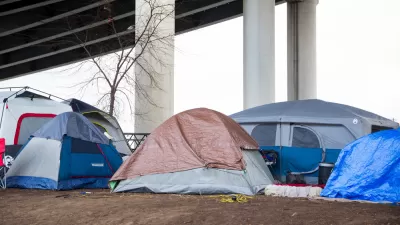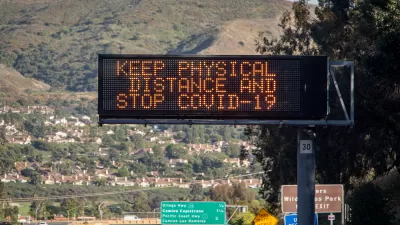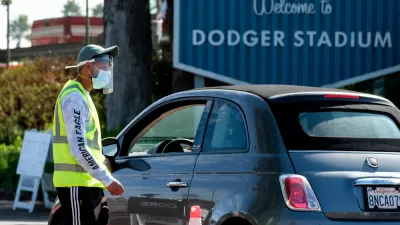Votes exceeded the two-thirds threshold to pass two vital transportation funding measures in San Francisco and Alameda counties. In Berkeley (which passed the nation's first soda tax) and Menlo Park, voters resoundingly reject anti-growth measures.
"The Bay Area’s two transportation tax measures were on track to capture the two-thirds majority needed for approval," writes Michael Cabanatuan, transportation reporter for the San Francisco Chronicle.
San Francisco voters were supporting [71.27 percent to 28.73 percent] Proposition A, a $500 million bond measure to be used for redesigned streets, more bike and transit-only lanes, updated traffic signals, improved maintenance facilities, and new elevators and escalators at Metro stations.
By comparison, we reported today that the state of Rhode Island passed a $35 million bond to fund transportation improvements. In that post, we also noted that San Francisco's "car-first" Measure L was resoundingly defeated.
In Alameda County, "the $7.8 billion Measure BB was closer but appeared headed toward the needed two-thirds approval," writes Cabanatuan. "The 30-year tax measure, nearly identical to one that narrowly failed in 2012, would extend an existing half-cent sales tax and tack on another half cent."
Turning to land use, the two "anti-growth measures adopting pro-growth language to survive" didn't survive in the ballot box—they were trounced on both sides of the Bay.
Berkeleyside reports that Measure R was rejected by 74 percent of voters, and incidentally, Measure D (soda tax) won with 75 percent of the vote—the nation's first such tax to pass. San Francisco's soda tax (Proposition E) received 57 percent, not meeting the two-thirds threshold to pass, reports Huffington Post.
On the peninsula, "Menlo Park voters (gave) Measure M a drubbing," writes Rhea Mahbubani of the San Jose Mercury News on the divisive "initiative that would have tightly restricted downtown office development."
With all 25 precincts reporting, unofficial election results show that 62.3 percent of voters rejected Measure M. (It) was championed by Save Menlo, a grassroots group of residents who fear developers will exploit loopholes in the El Camino Real/Downtown Specific Plan to build huge, traffic generating office towers and ruin the city's "village character." The group collected more than 2,400 petition signatures to qualify the initiative for the Nov. 4 ballot.
Readers may recall a recent post referencing San Diego environmental attorney Marco Gonzalez who wrote that the term, “community character” was code for not only opposing density, but then some:
But I’ll tell you what has been astounding to me. It is that, the “community character” argument is the most powerful sword being thrown up by communities who really don’t want brown people, who really don’t want poor people, who really don’t want to see a development come into their neighborhood because they’ve got theirs, and they don’t care if someone else can’t get the same thing.
FULL STORY: Transportation measures in S.F., Alameda County win support

Planetizen Federal Action Tracker
A weekly monitor of how Trump’s orders and actions are impacting planners and planning in America.

Map: Where Senate Republicans Want to Sell Your Public Lands
For public land advocates, the Senate Republicans’ proposal to sell millions of acres of public land in the West is “the biggest fight of their careers.”

Restaurant Patios Were a Pandemic Win — Why Were They so Hard to Keep?
Social distancing requirements and changes in travel patterns prompted cities to pilot new uses for street and sidewalk space. Then it got complicated.

Platform Pilsner: Vancouver Transit Agency Releases... a Beer?
TransLink will receive a portion of every sale of the four-pack.

Toronto Weighs Cheaper Transit, Parking Hikes for Major Events
Special event rates would take effect during large festivals, sports games and concerts to ‘discourage driving, manage congestion and free up space for transit.”

Berlin to Consider Car-Free Zone Larger Than Manhattan
The area bound by the 22-mile Ringbahn would still allow 12 uses of a private automobile per year per person, and several other exemptions.
Urban Design for Planners 1: Software Tools
This six-course series explores essential urban design concepts using open source software and equips planners with the tools they need to participate fully in the urban design process.
Planning for Universal Design
Learn the tools for implementing Universal Design in planning regulations.
Heyer Gruel & Associates PA
JM Goldson LLC
Custer County Colorado
City of Camden Redevelopment Agency
City of Astoria
Transportation Research & Education Center (TREC) at Portland State University
Camden Redevelopment Agency
City of Claremont
Municipality of Princeton (NJ)





























